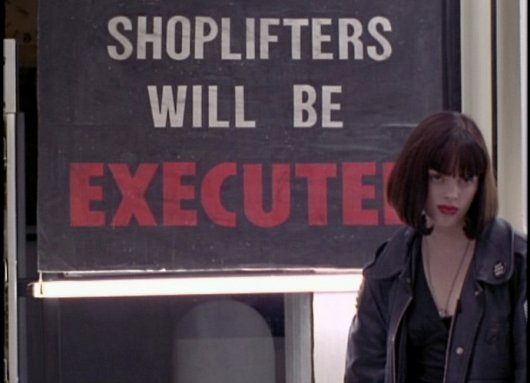
Youth Doom Fantasies
by RYAN LINKOF
dir. Gregg Araki
86 minutes
The lead characters in Kaboom drive a Nissan Cube. No element of the film sums up where the director Gregg Araki went wrong more than that. Like those singularly-offensive automobiles – hideously overdesigned and strangely proportioned – the film is all flash and polish, lacking any basic structural integrity. The choice of automobile also speaks to how far Araki has come in the evolution of his filmmaking. Whereas the doomed teenagers of his earlier films drove barely-operative vintage cars, with skulls dangling from the rearview mirror and Thrill Kill Cult stickers pasted on the bumper, his new breed of supposedly-troubled teens are driving their slick cars off the dealer’s lot.
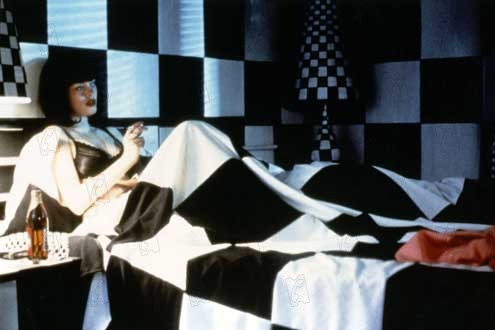
I have been (and part of me still wants to be) a fanatical devotee of Araki’s films. Watching The Doom Generation on VHS in my grandparents’ guestroom – terrified that they would walk in – is still one of the most memorable cinematic experiences I have ever had. I love his early films, and I know that they have informed much of my humor and aesthetic sensibility. Rose McGowan’s preposterously bitchy speed-freak was an ideal typical representation of disaffected young adulthood when I was a teenager: I wanted so badly to be her. The dark eroticism, pop nihilism, and bizarre crudities of his films defined a moment in queer cinema history, and for that I will also give Araki the benefit of the doubt.
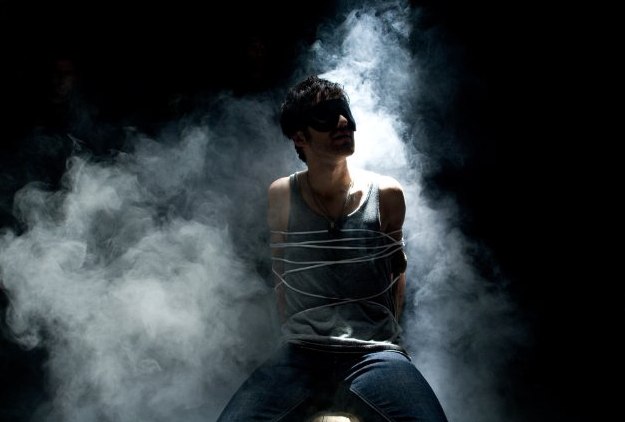
This film is kind of like a hybrid of Nowhere and a Top Shop window display. I am not one who demands that my indie films eschew commodity culture, but I guess I didn’t expect, or really want, the film to be so overly-processed and glossy. For those who have seen or will see the film, to call it “commercial” might seem a bit ridiculous. Kaboom does many things that one would never see in a mainstream film. But I had heard several people describe the film as Araki’s “return to form,” which I interpreted to mean an exercise in what had made him so appealing in the early and mid-90s.
I am not one who admired Mysterious Skin as some kind of proof of the maturation of Araki’s filmmaking. 2007’s Smiley Face, which was ostensibly much more sophomoric, was ultimately more intelligent and satisfying to watch than anything that Araki had made in a decade. Kaboom, unfortunately, has too much of Mysterious Skin’s “grown up” seriousness to provide the kind of raw and exhilarating experience of his earlier films.
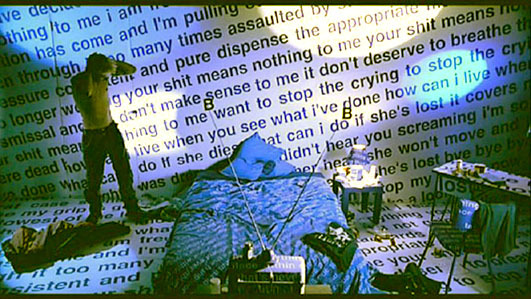
On the surface, Kaboom has the basic elements that I love about Araki’s early films. The story follows Smith (Thomas Dekker), a young, sexually adventurous, and predictably angsty film student in search of a profound romantic connection that seems constantly to elude him. Dekker is, I think, charming and vulnerable and subtle enough to make the heartfelt earnestness of the character not ring entirely false.
He is joined by a random assortment of friends in garish outfits, each with their own variety of piercingly vivid eye color. His best friend Stella (Haley Bennett) is a dry and droll lesbian, though Bennett is perhaps a bit too cute to pull of that role with any amount of believability. The star of the film, as far as I am concerned, is the wild-haired London (Juno Temple), who seduces Smith into a strange and (ultimately unsettling) sexual affair.

The film works best when it has no plot – the candy-colored scenes of sex, drugs, and high-caloric diner foods are fun enough to watch on their own. There is much nudity and homoerotic titillation, though the real sexual action is of a decidedly heterosexual or lesbian variety. Oddly, given Araki’s identification with queer cinema, gay men get the short end of the stick when it comes to on-camera sex.
The set design is far less clever and imaginative in this film than in Araki’s earlier films. The flamboyant color arrangements, odd wall patterns, and jarring, bold lettering announcing various authoritarian commands that typified The Doom Generation and Nowhere are altogether absent in Kaboom. Even Smith’s dorm room is an unimaginative mix of Ikea furnishings.
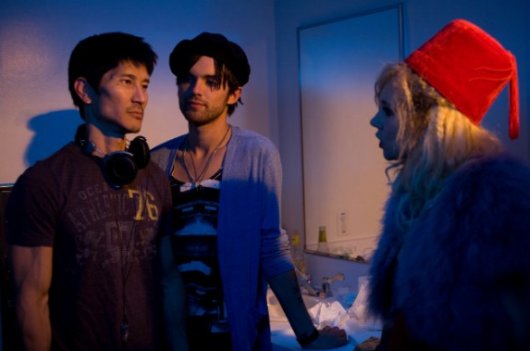
The actual plot is cringe-worthy, bound together by an outlandish storyline that affords the main characters as many opportunities as possible to constantly blurt out derivatives of “Something very weird is happening here!” Like Nowhere (the film in Araki’s oeuvre that Kaboom most resembles), sex and violence are mixed with creepy supernatural themes, but whereas that earlier film left much to the imagination, this one hammers the audience over the head with plot revelations that end up eliminating any traces of mystery. Kaboom might have worked better simply as a sex romp, and could have done without the pseudo-profound social commentary and overly elaborate narrative developments.
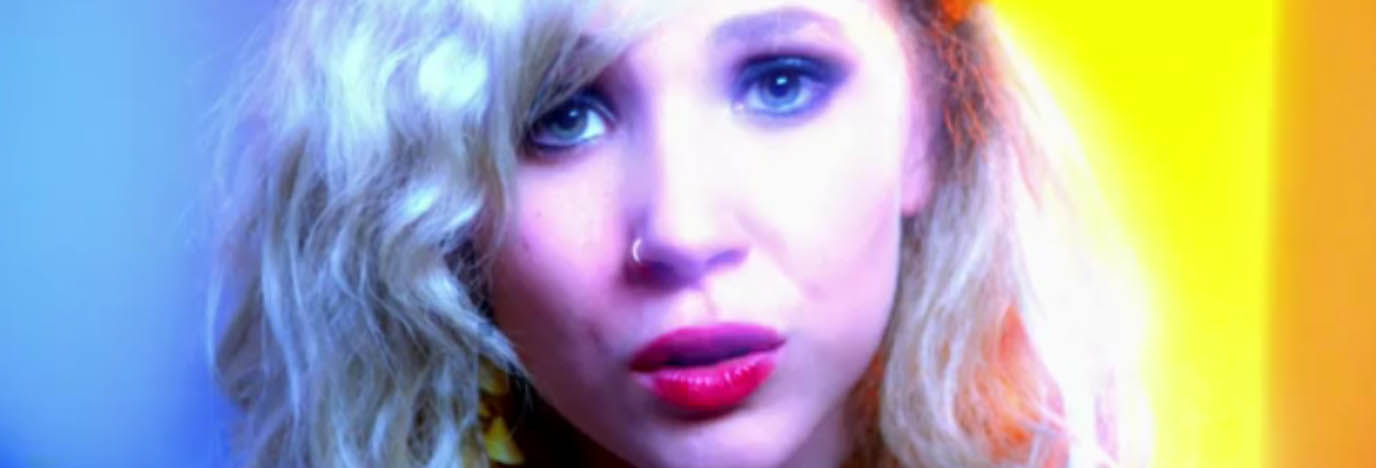
Any opportunity for good-looking people to get nude, especially if that nudity is mixed with unnecessary and cartoonish violence, is typically okay by me. But for some reason, even for a fan of all that, sex and violence just wasn’t enough to make this movie work. Maybe I am just an aging curmudgeon, looking back to a time when films were somehow more "real." The films Araki produced in the 90s were, I am convinced, quite special and unique, but perhaps it is unfair to use them as standard to which every subsequent film must be held. In the end, I guess I just expect so much more from Araki. His big attempt at reigniting the explosive energy of his early films seems only to have resulted in a disappointing fizzle.
Ryan Linkof is a contributor to This Recording. He is a writer living in Los Angeles, and a PhD candidate in History and Visual Culture at the University of Southern California. This is his first appearance in these pages. He tumbls here.

"Copenhagen" - Lucinda Williams (mp3)
"Born to Be Loved" - Lucinda Williams (mp3)
"Seeing Black" - Lucinda Williams (mp3)
